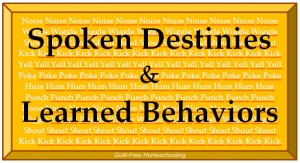The high school senior was asked to read a portion from the Bible during his Sunday School class. He struggled painfully over nearly every word. His efforts were so halting and disjointed that no one could follow the context of the passage easily. A girl seated next to him followed along in her own Bible, helping him with most of the words. The truly appalling part of this story is not that the twelfth grade student could not read fluently, but that no one in the room seemed to think it was at all unusual to have such difficulty in reading aloud. This young man, who was well known at school and considered a popular classmate and a “good” student, was probably reading at around a 2nd grade level. And none of his classmates in the room was alarmed by his performance.
The techniques that were used to teach reading when my daughter was in public school included identifying words by their unique shapes. “Does the word start with a letter that is taller than the others? Does the word end with a letter that dangles down below the others? Does the word have a roundish letter in the middle? That word is boy.” (Unless the word happens to be dog. Or toy. Hmmm. It could even be log.) Pictorial clues were also used to help identify words: “Let’s look at the picture in the storybook and guess which word fits best in the sentence. Yes, it must be boy. See that little guy sitting on a fallen tree trunk, holding a stuffed cloth puppy? This story is about him, so the word is definitely boy.” (Or not. If you missed the irony in my example, go back and read it again.) My daughter can still testify to the indoctrination of “identifying” words by only a few letters: she recently glanced at a price tag, bearing the code R8052CY, and mistook it for the word “Regency.”
When confusion over the correct word sets in, the popular instruction in today’s classrooms encourages students to think of words that start with the sound of the first letter or two in the word, again guessing a word they are familiar with that will fit with the rest of the sentence or story. I cannot judge your reading ability or your vocabulary, but I know that I occasionally find unfamiliar words in things that I read — now — today. How can a beginning reader be expected to know what all words will look like even before he can read them?
As you may suspect, children who have been taught to “read” using this shape-guessing technique do not become fluent readers. They do not enjoy reading. They cannot read quickly. They do not like to read aloud and, when forced to read aloud, do so slowly and without confidence. They are never quite sure if the letter is a b or a d or if it is a q or a p or a g. Ch- can make several sounds — how will they know which one to use? And do not even bring up a word containing -ough! These students are quickly labeled “dyslexic” and told that they have confusion over letter placements within words, but they are seldom given any instruction for how to overcome this difficulty. These students have little comprehension of what they read: they cannot understand what they read, so they also cannot remember what they read. Is it any wonder that they do poorly in school? Some who act out their frustrations at the inconsistency in their abilities are further labeled ADD, ADHD, and other multi-letter classifications which entitle the school to receive additional funding. And yet the funding does not translate into more efficient teaching methods.
So when is reading not reading? Obviously, the examples given above are not reading — they are guessing. To read, a person must recognize each letter, the sound it makes, and how it acts in combinations with other letters. Letters must be read as their sounds and not as their names, and the sounds of the letters must be read in the order that they appear within the word. Certain combinations of letters appear over and over again in various words, forming patterns. Phonics is the study of the sounds made by those letter combinations and patterns. Guessing at the visual shapes of words has nothing whatsoever to do with the sounds of letters. My daughter had been terribly confused by the difference between letter names and letter sounds: she thought they were interchangeable, since her school readily accepted her spelling of words such as “invite” as n-v-i-t. Incidentally, the “sight reading” method was invented as a way to teach deaf children to read — children who had no ability to sound out words. One would think that “professional” educators could recognize it as a “last resort” method for children who can hear, being far inferior to reading by sounds.
Phonics instruction includes the rules for breaking words into their syllables. (Lesson #1 being that a syllable must have at least one vowel; a word with only one vowel can therefore be only one syllable. I recently had to pull out my trusty dictionary to prove to a skeptic that the word rhythm has only one syllable, since it contains only the single vowel y.) Recognizing individual syllables enables the student to read even long, complicated chemical names as a series of smaller word-parts making up the big word. Learning about prefixes and suffixes and root words as a part of phonics enables the student to separate syllables easily and to understand the meanings of the various parts of a multi-syllable word, bringing understanding along with the reading process. Phonics will successfully teach a student to read, and a student who understands phonics will be able to read any word placed before him. Any word. He may need to consult a dictionary for its exact meaning, but the phonetic reader can come close to the correct pronunciation.
An independent organization that evaluates the performance of various industries recently looked into the performance of the public schools in my state. What it found most surprising was that the “proficiency” standards for each grade level have been redefined. A student who is considered “proficient” for fourth grade only has to measure up to third grade standards. And the gap widens considerably with advancing grade levels, to the point that a graduating senior’s “proficiency” level is several years below what should be expected from a twelfth grade education. That could be compared to going to a store and attempting to purchase your items with a $20 bill and being told that your cash is really only worth $15 in spending power, inflation arguments aside. Regardless of the denomination printed on the currency (or the report card), reality lies far below the appearance. Most of us would be upset to learn that the “proficiency” standards of a new home were skewed to the point that when the builder says the house contains five bedrooms, he really means that it has only enough room for three people to sleep comfortably. I would not want to purchase a 12-pack of sodas and find that the box actually contained only eight cans. And yet, that is the same false advertising that is being accepted from the public schools. Proficient does not mean proficient, and reading does not mean reading.
The real tragedy here is that students are passing through school, not knowing how to read properly. (A young acquaintance recently commented that she “flunked tenth grade, but was still going on into eleventh.” How does that even happen?) These students are being led to believe that they are adequately prepared for college, where they will be expected to consume massive amounts of reading materials and retain that knowledge for future reference. A student who has mild to moderate difficulty reading a child’s storybook will have incredible difficulty digesting college-level texts at the commonly expected rate of one hundred pages per night. Is it any wonder that the average 4-year bachelor’s degree now takes at least five years to attain?
Parents, if you have chosen to homeschool your children, do not neglect a thorough study of phonics in your lesson plans. The time you devote to studying spelling patterns, syllable divisions, prefixes, suffixes, roots, and word origins will set your students apart from their peers and give them a tremendous boost toward independent learning for the rest of their lives. As my husband recently quipped, “Once you’re over 50, if you don’t know phonics, you can’t remember how to spell anything!”




 Guilt-Free Homeschooling is the creation of Carolyn Morrison and her daughter, Jennifer Leonhard. After serious disappointments with public school, Carolyn spent the next 11 years homeschooling her two children, from elementary to high school graduation and college admission. Refusing to force new homeschooling families to re-invent the wheel, Carolyn and Jennifer now share their encouragement, support, tips, and tricks, filling their blog with "all the answers we were looking for as a new-to-homeschooling family" and making this website a valuable resource for parents, not just a daily journal. Guilt-Free Homeschooling -- Equipping Parents for Homeschooling Success!
Guilt-Free Homeschooling is the creation of Carolyn Morrison and her daughter, Jennifer Leonhard. After serious disappointments with public school, Carolyn spent the next 11 years homeschooling her two children, from elementary to high school graduation and college admission. Refusing to force new homeschooling families to re-invent the wheel, Carolyn and Jennifer now share their encouragement, support, tips, and tricks, filling their blog with "all the answers we were looking for as a new-to-homeschooling family" and making this website a valuable resource for parents, not just a daily journal. Guilt-Free Homeschooling -- Equipping Parents for Homeschooling Success!

Recent Comments